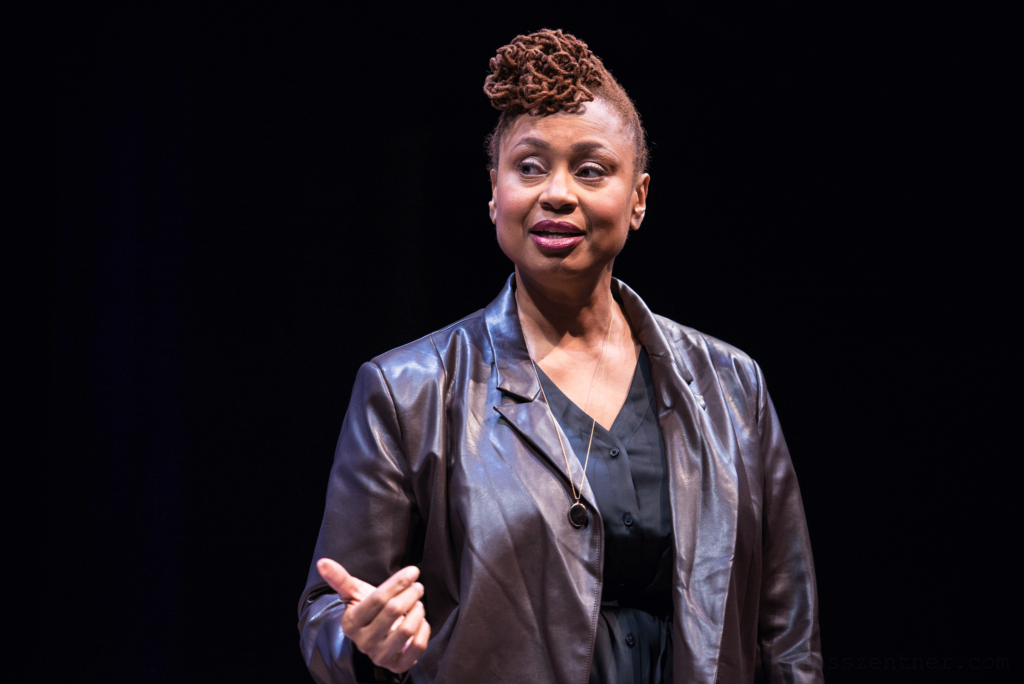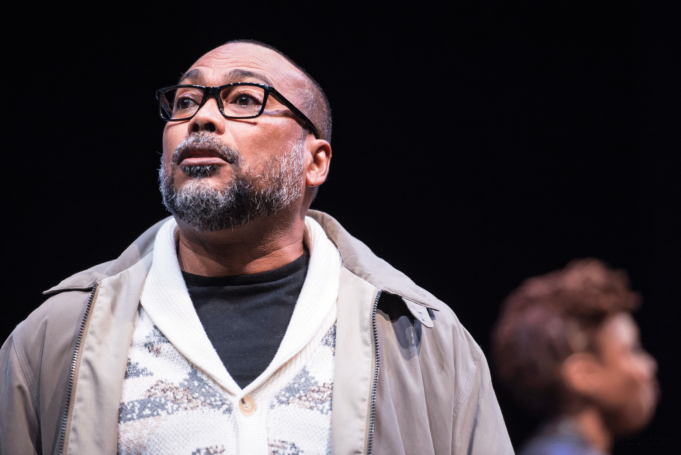At first glance, nothing about Quan Barry’s debut play, “The Mytilenean Debate” is loud. The 90-minute one-act show, which is directed by UW-Madison Theater and Drama professor Mark Hairston, stars four actors who never leave the stage, switching places for one-on-one conversations by shuffling three plain wooden chairs in and out of the spotlight.
But as the play progresses, it becomes clear that there’s much more in the room than these four people—each brings a set of identities, expectations and fears that shape their relationships and life trajectories. A tale that lies at the intersections of choice, legacy, and regret, “The Mytilenean Debate” explores the complex terrain of the ethics of reproduction and the weight of a woman’s choice in a world marred by loss, prejudice and suffering.
“The Mytilenean Debate” takes place on designer Keith Pitt’s deceptively simple set—the characters, who don the same subtle outfits (designed by Jazmin Aurora Medina) over the course of the show and are accessorized by a mere prop or two, take to a square stage covered in rubble backed by a replica of the World Trade Center’s slurry wall. Meant to symbolize the story’s post-9/11 backdrop, to be watching this play from within the belly of the COVID-19 pandemic feels particularly resonant.
Having just suffered a human tragedy that has made them rethink the safety and kindness of the world, the hopeful Mary (Samra Teferra) and career-driven Nina (Olivia Dawson) find themselves contemplating what it means to have a child, thoughts that echo the anxieties that haunt us today—while the world crumbles around us, what is our duty to human life? What more if we are bestowed with the task of caring for society’s most vulnerable?

Mary and Nina approach questions of duty and motherhood from almost exact opposite directions. Mary, the adult daughter of the self-assured and suave Latimer ( Gavin Lawrence), Nina’s long-term partner, is a dissertating PhD student who wants to start a family of her own. Nina, on the other hand, is a successful TV producer in the prime of her career. Questioning her long-standing lack of desire to be a mother, Nina is torn over whether or not to terminate her pregnancy—a sound decision that is only destabilized once she learns that the child will be differently-abled.
Their partners, Latimer and Charles (played by Marcus Truschinski), grapple with their own inner turmoil surrounding legacy. While the sound-minded Latimer juggles the pressures of Black excellence, Charles, whose career as a jazz musician has yet to take off, is forced to confront the truth about who he wants to be in the world. With a mirror pointed towards our own world, Barry reveals that legacy is not only about what we leave behind, but that which we refuse to claim as ours.
What makes Barry’s play so successful is the fresh complexity with which she addresses age-old questions and deeply ingrained societal hierarchies. In a climate where conversations around pregnancy and abortion can feel exhausted and circuitous, Nina’s character offers a new focal point from which to differentiate between right and wrong, between duty and desire.
Beyond the issues of bodily autonomy and women’s rights, Mary and Charles’s biting back-and-forths interrogate the topic of interracial love through a new lens, challenging the legibility we often ascribe to race, class, and gender. Charles is tormented by what others might think of him as a white musician in the historically Black genre and scene, and that much more with a Black wife. Through his character, “The Mytilenean Debate” asks the question: are sociopolitical identities like race and class irreconcilable differences? Even if they aren’t, is it easier for everyone involved if we say that they are?
At the heart of “The Mytilenean Debate” is the heavy truth that our decisions are never just our own to make. Barry illuminates how loud choices can feel when we cannot quiet the noise of our surroundings enough to listen to our conscience, and only our own conscience. Pushed up against the expectations of society, each other, and even our own selves, which desires ring loudly enough for us to hear and follow?
While its lively pace is one of the key strengths of “The Mytilenean Debate,” there are moments where it is hard to locate the actors, both in space and time. Switching briskly between conversations in the therapist office, at a cafe, or at Latimer’s apartment, the audience is left balancing the roles of incidental interlopers and indicted viewers.
Forward Theater Company’s production of “The Mytilenean Debate” will run at Overture Center for the Arts through March 13. Tickets are available for purchase here.










